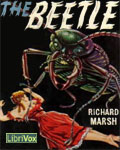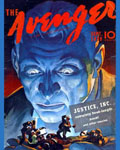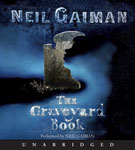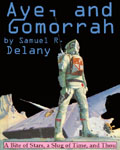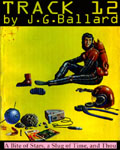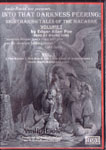
 Tantor Media has released about sixty Science Fiction and Fantasy audiobooks in the last six months.
Tantor Media has released about sixty Science Fiction and Fantasy audiobooks in the last six months.
That’s a staggering figure.
When we started SFFaudio, back in 2003, there were fewer than sixty SFF audiobooks released in an entire year from all the audiobook publishers combined!
Here are just a few 2009 and 2010 Tantor titles that are both previously unposted and personally interesting to me…
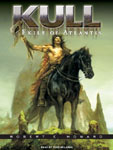 Kull: Exile Of Atlantis
Kull: Exile Of Atlantis
By Robert E. Howard; Read by Todd McLaren
10 CDs – Approx. 12 Hours [UNABRIDGED]
Publisher: Tantor Media
Published: December 2009
ISBN: 9781400112272
In a meteoric career that spanned a mere twelve years, Robert E. Howard single-handedly invented the genre that came to be called sword and sorcery. From his fertile imagination sprang some of fiction’s most enduring heroes. Yet while Conan the Cimmerian is indisputably Howard’s greatest creation, it was in his earlier sequence of tales featuring Kull, a fearless warrior with the brooding intellect of a philosopher, that Howard began to develop the distinctive themes and the richly evocative blend of history and mythology that would distinguish his later tales of the Hyborian Age. Much more than simply the prototype for Conan, Kull is a fascinating character in his own right: an exile from fabled Atlantis who wins the crown of Valusia, only to find it as much a burden as a prize. This groundbreaking collection brings together all of Howard’s stories featuring Kull: Exile of Atlantis, The Shadow Kingdom, The Mirrors of Tuzun Thune, The Cat And The Skull, The Screaming Skull Of Silence, The Striking Of The Gong, The Altar and the Scorpion, The Curse of the Golden Skull, By This Axe I Rule!, Swords Of The Purple Kingdom, The King And The Oak, and Kings Of The Night
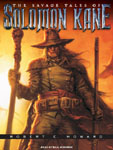 The Savage Tales Of Solomon Kane
The Savage Tales Of Solomon Kane
By Robert E. Howard; Read by Paul Boehmer
10 CDs – Approx. 12.5 Hours [UNABRIDGED]
Publisher: Tantor Media
Published: January 2010
ISBN: 9781400112289
With Conan the Cimmerian, Robert E. Howard created more than the greatest action hero of the twentieth century — he also launched a genre that came to be known as sword and sorcery. But Conan was not the first archetypal adventurer to spring from Howard’s fertile imagination. He was…a strange blending of Puritan and Cavalier, with a touch of the ancient philosopher, and more than a touch of the pagan…. A hunger in his soul drove him on and on, an urge to right all wrongs, protect all weaker things…. Wayward and restless as the wind, he was consistent in only one respect—he was true to his ideals of justice and right. Such was Solomon Kane. Collected in this volume are all of the stories that make up the thrilling saga of the dour and deadly Puritan: Skulls In The Stars, The Right Hand Of Doom, Red Shadows, Rattle Of Bones, The Castle Of The Devil, Death’s Black Riders, The Moon Of Skulls, The One Black Stain, The Blue Flame Of Vengeance, The Hills Of The Dead, Hawk Of Basti, The Return Of Sir Richard Grenville, Wings In The Night, The Footfalls Within, The Children Of Asshur, and Solomon Kane’s Homecoming.
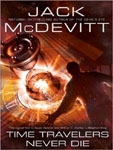 Time Travelers Never Die
Time Travelers Never Die
By Jack McDevitt; Read by Paul Boehmer
12 CDs – Approx. 14.5 Hours [UNABRIDGED]
ISBN: 9781400114337
Publisher: Tantor Media
Publsihed: January 2010
When physicist Michael Shelborne mysteriously vanishes, his son Shel discovers that he had constructed a time travel device. Fearing his father may be stranded in time—or worse—Shel enlists Dave Dryden, a linguist, to accompany him on the rescue mission. Their journey through history takes them from the Enlightenment of Renaissance Italy through the American Wild West to the civil rights upheavals of the twentieth century. Along the way, they encounter a diverse cast of historical greats, sometimes in unexpected situations. Yet the elder Shelborne remains elusive. And then Shel violates his agreement with Dave not to visit the future. There he makes a devastating discovery that sends him fleeing back through the ages and changes his life forever.
 Best Served Cold
Best Served Cold
By Joe Abercrombie; Read by Michael Page
22 CDs – 27.5 Hours [UNABRIDGED]
Publisher: Tantor Media
Published: December 2009
ISBN: 9781400113279
Springtime in Styria. And that means war. There have been nineteen years of blood. The ruthless Grand Duke Orso is locked in a vicious struggle with the squabbling League of Eight, and between them they have bled the land white. While armies march, heads roll, and cities burn, behind the scenes bankers, priests, and older, darker powers play a deadly game to choose who will be king. War may be hell, but for Monza Murcatto, the Snake of Talins, the most feared and famous mercenary in Duke Orso’s employ, it’s a damn good way of making money too. Her victories have made her popular—a shade too popular for her employer’s taste. Betrayed, thrown down a mountain, and left for dead, Murcatto’s reward is a broken body and a burning hunger for vengeance. Whatever the cost, seven men must die. Her allies include Styria’s least reliable drunkard, Styria’s most treacherous poisoner, a mass murderer obsessed with numbers, and a barbarian who just wants to do the right thing. Her enemies number the better half of the nation. And that’s all before the most dangerous man in the world is dispatched to hunt her down and finish the job Duke Orso started. Springtime in Styria. And that means revenge.
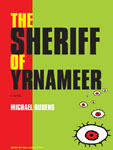 The Sheriff of Yrnameer
The Sheriff of Yrnameer
By Michael Rubens; Read by William Dufris
8 CDs – Approx. 9.5 Hours [UNABRIDGED]
Publisher: Tantor Media
Published: August 2009
ISBN: 9781400113255
Meet Cole: hapless space rogue, part-time smuggler, on a path to being full-time dead. His sidekick just stole his girlfriend. The galaxy’s most hideous and feared bounty hunter wants to lay eggs in his brain. And the luxury space yacht Cole just hijacked turns out of be filled with interstellar do-gooders, one especially loathsome stowaway, and a cargo of freeze-dried orphans. Reluctantly compelled to deliver these defenseless, fluidless children to safety, Cole gathers a misfit crew for a desperate journey to the far reaches of the galaxy. Their destination: the mysterious world of Yrnameer, the very last of the your-name-heres—planets without corporate sponsors. But little does Cole know that this legendary utopia is home to a murderous band of outlaws bent on destroying the planet’s tiny, peaceful community. Follow Cole’s adventures through a delightfully absurd science-fiction universe, where the artificial intelligence is stupid, dust motes carry branding messages, and middle-management zombies have overrun a corporate training satellite. In the spirit of Douglas Adams and Terry Pratchett, The Sheriff of Yrnameer is sci-fi comedy at its best—mordant, raucously funny, and a thrilling must-listen.
 The Unincorporated Man
The Unincorporated Man
By Dani Kollin and Eytan Kollin; Read by Todd McLaren
19 CDs – Approx. 24.5 Hours [UNABRIDGED]
Publisher: Tantor Media
Published: May 2009
ISBN: 9781400111725
The Unincorporated Man is a provocative social/political/economic novel that takes place in the future, after civilization has fallen into complete economic collapse. This reborn civilization is one in which every individual is incorporated at birth and spends many years trying to attain control over his or her own life by getting a majority of his or her own shares. Life extension has made life very long indeed. Now the incredible has happened: a billionaire businessman from our time, frozen in secret in the early twenty-first century, is discovered and resurrected, given health and a vigorous younger body. Justin Cord is the only unincorporated man in the world, a true stranger in this strange land. Justin survived because he is tough and smart. He cannot accept only part ownership of himself, even if that places him in conflict with a civilization that extends outside the solar system to the Oort Cloud. People will be arguing about this novel and this world for decades.
Which of the other SFF titles from 2009 (and forthcoming in 2010) from Tantor are of interest to you folks? Click HERE to check out the list. Then post your list below.
Posted by Jesse Willis


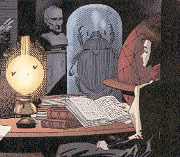 Attentive readers of Alan Moore’s
Attentive readers of Alan Moore’s 